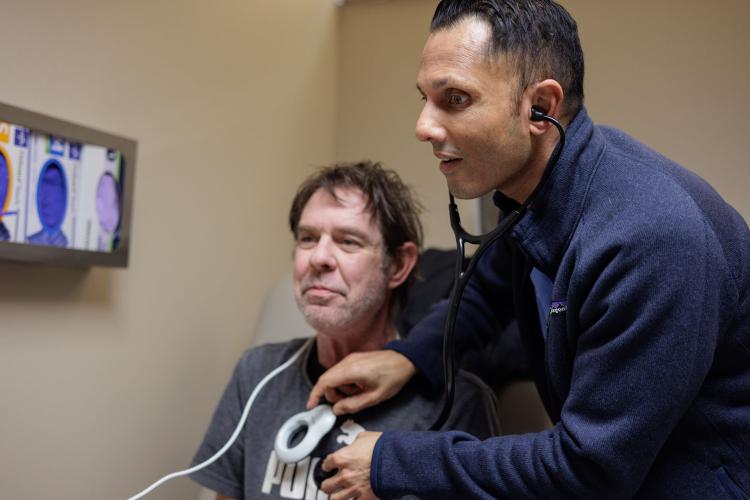
JPS Health Network patient, Lonnie Floyd has a history of heart problems. He suffers from congestive heart failure and atrial fibrillation (a-fib), which he believes is due to his long history of smoking and drinking. One day, Floyd was in bed watching a television show when his fiancé noticed he was having seizure-like symptoms. Then he collapsed. When she called 911, she didn't know what to do, so the operator provided her with instructions on how to assess and begin performing CPR.
"I woke up seven days later in the hospital, and I was confused," Floyd said. "I remember my fiancé saying, 'You were dead,' and I was like, 'No way,' but I am grateful for the care I was provided because a lot of people said I shouldn't have survived."
Floyd expresses his gratitude to EMS and JPS for the lifesaving care he was provided.
"I am grateful for MedStar, who showed up that day. They were there within three minutes. Had it been any longer, I probably wouldn't have survived. So, they played a pivotal part in my survival," Floyd said. "As for JPS, I have nothing bad to say about my care. They were absolutely caring, and they provided the best care. I admire and respect everyone at JPS," Floyd said.
The heart is a delicate organ essential to maintaining health and leading a long life. According to the American Heart Association, Cardiac arrest is "an electrical malfunction in the heart that causes an irregular heartbeat and disrupts the flow of blood to the brain, lungs, and other organs." It is a leading cause of death, and "each year, more than 350,000 EMS-assessed out-of-hospital cardiac arrests occur in the United States." Even if you've started out rough, there is still time to make lifestyle changes to sustain it. This experience has influenced Floyd to make lifestyle changes needed to improve his health.
"I don't smoke or drink as much as I used to, and I am working on quitting completely,” Floyd said. “I have changed my diet a lot also. I eat low-sodium food, less red meat, and more vegetables."
Floyd shares that before, he didn't really grasp the severity of his situation because he was living life and wished he had done more to prevent his outcome.
"I wish I would have done more, but I was given a second chance so that I can do more," Floyd said. "Before, I didn't care because I didn't know. I thought I was the 'immortal Peter Pan,' and I thought I'd live forever and not grow old, but I'm not. I had no idea that would happen that day, but I learned from it."
"I wish I would have done more, but I was given a second chance so that I can do more"
Krissy Feinauer, BSN, RN, LSSYB, Chest Pain Program Coordinator, says that not many cardiac arrest patients leave the hospital in a good state, so Mr. Floyd's success story is impactful and shows how important early intervention can be.
"It's always good to see cardiac arrest patients on the other side with successful outcomes," Feinauer said.
Bystander CPR was helpful in Floyd's success story. Can you perform CPR for 10 minutes to allow enough time for EMS to arrive? Being able to do so immediately may increase the survival rate of someone experiencing cardiac arrest.
"Studies and research have shown that the initial CPR impacts survival and good neurological outcomes," Feinauer said. "It's called 'Hands only CPR' - getting hands on the chest and reperfusion (restoring blood flow) to the heart by pushing hard and fast. As quickly as you can, start CPR. Because bystander CPR is the key."
In addition to beginning CPR, getting first responders on the scene as quickly as possible is crucial to survival.
"Another key contributor is calling 911, which activates that emergency response and allows for early intervention by EMS," Feinauer said. "A trend we are seeing, especially with our patients experiencing heart attacks, are more people driving themselves to the hospital during these cases, and that's not what we want to see. So, if you or a loved one are experiencing any type of heart problems, chest pain, or shortness of breath, call 911 and begin CPR."
